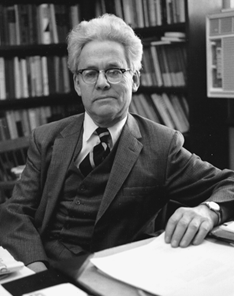Post Date: January 16, 2007
Professor Emeritus Richard A. Musgrave, a leading 20th century political economist who taught at Harvard University and at Harvard Law School between 1965 and 1981, died January 15 at the age of 96.
“Richard Musgrave was one of the great economists and thinkers of the post-war era and beyond, and the Harvard Law School community is grateful for the years that we had the benefit of his wisdom here,” said Dean Elena Kagan ’86. “His contributions to the field of public finance are immense, and he will forever be recognized as one of the true pioneers and scholars in that area.”
Musgrave was born in Koenigstein, Germany in 1910 and received his early education in Munich and Heidelberg. He came to the United States in 1933 as an exchange student, and decided not to return to Nazi Germany. He received his Ph.D. in economics from Harvard in 1937.
During the war years and up until 1948, Musgrave worked as an economist for the Federal Reserve Board in Washington, D.C., and then taught economics at Johns Hopkins, the University of Michigan and at Princeton before joining the Harvard faculty in 1965.
He taught tax and expenditure policy, economics for lawyers, and taxation and economic development, among other courses. He was appointed the Harold Hitchings Burbank Professor of Political Economy and Professor of Economics in 1970, the chair he occupied until he took emeritus status in 1981.
Musgrave was the first person to receive joint appointments to the faculty of Harvard University and Harvard Law School, according to Prof. Emeritus Oliver Oldman, a longtime friend and colleague.
Musgrave is widely viewed as one of the most influential economists of the last century, and a pioneer in the field of public finance. His 1959 book, “The Theory of Public Finance,” is considered by experts to be a springboard for important work that came later from economists such as Nobel Laureate Paul Samuelson, who credited Musgrave as a key influence.
